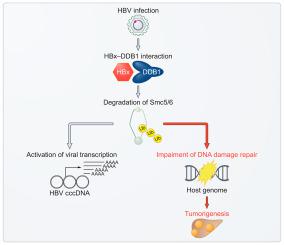Journal of Hepatology ( IF 26.8 ) Pub Date : 2021-08-31 , DOI: 10.1016/j.jhep.2021.08.010 Kazuma Sekiba 1 , Motoyuki Otsuka 2 , Kazuyoshi Funato 2 , Yu Miyakawa 2 , Eri Tanaka 2 , Takahiro Seimiya 1 , Mari Yamagami 2 , Takeya Tsutsumi 3 , Kazuya Okushin 4 , Kei Miyakawa 5 , Akihide Ryo 5 , Kazuhiko Koike 2

|
Background & Aims
HBV causes hepatocellular carcinoma (HCC). While it was recently shown that the ability of HBV X protein (HBx) to impair the Smc5/6 (structural maintenance of chromosome 5/6) complex is important for viral transcription, HBx is also a potent driver of HCC. However, the mechanism by which HBx expression induces hepatocarcinogenesis is unclear.
Methods
Degradation of the Smc5/6 complex and accumulation of DNA damage were observed in both in vivo and in vitro HBV infection models. Rescue experiments were performed using nitazoxanide (NTZ), which inhibits degradation of the Smc5/6 complex by HBx.
Results
HBx-triggered degradation of the Smc5/6 complex causes impaired homologous recombination (HR) repair of DNA double-strand breaks (DSBs), leading to cellular transformation. We found that DNA damage accumulated in the liver tissue of HBV-infected humanized chimeric mice, HBx-transgenic mice, and human tissues. HBx suppressed the HR repair of DSBs, including that induced by the CRISPR-Cas9 system, in an Smc5/6-dependent manner, which was rescued by restoring the Smc5/6 complex. NTZ restored HR repair in, and colony formation by, HBx-expressing cells.
Conclusions
Degradation of the Smc5/6 complex by HBx increases viral transcription and promotes cellular transformation by impairing HR repair of DSBs.
Lay summary
The hepatitis B virus expresses a regulatory protein called HBV X protein (or HBx). This protein degrades the Smc5/6 complex in human hepatocytes, which is essential for viral replication. We found that this process also plays a key role in the accumulation of DNA damage, which contributes to HBx-mediated tumorigenesis.
中文翻译:

HBx 诱导的 Smc5/6 复合物降解损害同源重组介导的受损 DNA 修复
背景与目标
HBV导致肝细胞癌(HCC)。虽然最近显示 HBV X 蛋白 (HBx) 损害 Smc5/6(染色体 5/6 的结构维持)复合物的能力对于病毒转录很重要,但 HBx 也是 HCC 的有效驱动因素。然而,HBx 表达诱导肝癌发生的机制尚不清楚。
方法
在体内和体外HBV 感染模型中均观察到 Smc5/6 复合物的降解和 DNA 损伤的积累。使用硝唑尼特 (NTZ) 进行救援实验,它抑制 HBx 对 Smc5/6 复合物的降解。
结果
HBx 触发的 Smc5/6 复合物降解导致 DNA 双链断裂 (DSB) 的同源重组 (HR) 修复受损,从而导致细胞转化。我们发现 HBV 感染的人源化嵌合小鼠、HBx 转基因小鼠和人体组织的肝组织中积累了 DNA 损伤。HBx 以依赖 Smc5/6 的方式抑制 DSB 的 HR 修复,包括由 CRISPR-Cas9 系统诱导的修复,通过恢复 Smc5/6 复合物得以挽救。NTZ 恢复了 HBx 表达细胞的 HR 修复和集落形成。
结论
HBx 降解 Smc5/6 复合物会增加病毒转录,并通过损害 DSB 的 HR 修复来促进细胞转化。
总结
乙型肝炎病毒表达一种称为 HBV X 蛋白(或 HBx)的调节蛋白。这种蛋白质降解人类肝细胞中的 Smc5/6 复合物,这对于病毒复制至关重要。我们发现这个过程在 DNA 损伤的积累中也起着关键作用,这有助于 HBx 介导的肿瘤发生。











































 京公网安备 11010802027423号
京公网安备 11010802027423号